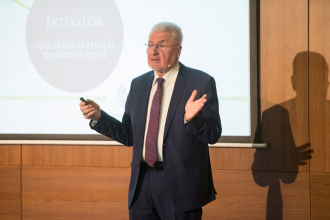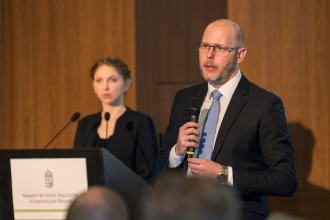Businesses in Hungary have launched 2,000 new research, development and innovation projects since 2015 with domestic and EU funding of HUF 300 billion (EUR 1 billion). Annual funding provided to businesses from the National Research, Development and Innovation Fund to promote innovation doubled in 2017 as compared to 2015.
In January 2018 new innovation calls were published with a total budget of HUF 61 billion (EUR 200 million) provided from the NRDI Fund, one of which is to promote the innovation activities of Hungarian micro and small-sized enterprises, said József Pálinkás on 6 February at the RDI Calls Forum, where potential applicants had the opportunity to learn useful information on the novelty features of RDI schemes in 2018. At the event the President of the NRDI Office gave a detailed analysis of funded projects from multiple perspectives, such as their professional and geographical distribution, on the basis of which the landscape of Hungary’s innovation capacities may be drawn.
Presentation by József Pálinkás, President of the NRDI Office: Review of Competitive RDI Calls - Forum for Applicants and Evaluators on calls promoting domestic innovation (PDF, 1827 KB)
Over the past three years more than 4,000 projects benefited from HUF 640 million (EUR 2.1 million) of non-refundable grants from domestic and EU sources in innovation-related competitive calls. RDI-related projects of businesses received funding of HUF 145 billion from EU Structural Funds (via the Economic Development and Innovation Operational Programme – EDIOP, and the Competitive Central Hungary Operational Programme – CCHOP). Approximately HUF 56 billion was allocated from the National Research, Development and Innovation Fund (NRDI Fund) to support the RDI projects of businesses. Projects implemented by businesses in cooperation with universities and research institutes won more than HUF 127 billion from Structural Funds. By facilitating mirror calls of the EDIOP schemes only available for the less developed regions, the NRDI Office promoted the cooperation between universities, research institutes and businesses in Budapest and Pest-county with nearly HUF 64 billion provided from the CCHOP and the NRDI Fund.
Since 2015 research centres and innovative businesses have won funding in competitive calls in a balanced manner: so far there are 1,895 awarded project proposals submitted by universities and research institutes and 1,981 submitted by businesses, and both sectors have received approximately the same amount of funding, namely HUF 300 billion (EUR 1 billion) each.
In his presentation József Pálinkás emphasized that RDI funds represent only a part of funding available for small- and medium-sized enterprises (SMEs). The set of objectives of EU calls available for SMEs until 2020 is diverse, one-fifth of them, HUF 424 billion (EUR 1.4 billion) serves the purpose of research, development and innovation. He added that the total budget of the NRDI Fund managed by the Office has significantly increased since 2015 to support businesses. In 2015 the NRDI Fund had HUF 15 billion (EUR 49 million) disbursed in support of the innovative players of the private sector, whereas by 2017 this amount increased to HUF 34 billion (EUR 111.5 million).
In the ranking of Budapest and the counties in terms of funding awarded in domestic and EU RDI calls university centres pursuing research and development activities are in the lead (Budapest, Csongrád county, Hajdú-Bihar county, Baranya county, Pest county) followed by industrial hubs (Borsod-Abaúj-Zemplén county, Bács-Kiskun county, Fejér county, Győr-Moson-Sopron county). The ranking shows that funding available from Structural Funds in less developed regions was considerably counter-balanced by mirror calls in the field of RDI funded by the NRDI Fund, which were open to businesses in Budapest and Pest county which were not eligible under the terms of EDIOP calls.
In 2018 the total budget of the NRDI Fund for the RDI activities of businesses is HUF 30 billion (nearly EUR 100 million), the cooperation between research and industry is supported by another HUF 31 billion in total, which includes five thematic programmes as well, ranging from artificial intelligence through clean drinking water up to research projects related to the new laser facility in Szeged. The call for proposals for domestic micro and small-sized enterprises (2018-1.1.1-MKI) has a total budget of HUF 10 billion (EUR 33 million), whereas the call available for the entire corporate sector (including medium-sized enterprises and large companies) to promote innovative and marketable products, technologies (2018-1.1.2-KFI) has a total budget of HUF 20 billion (EUR 65 million).
|
|
The NRDI Office held a similar event on calls fostering discovery research on 25 January 2018.








